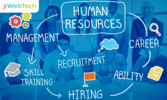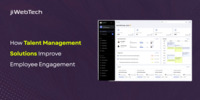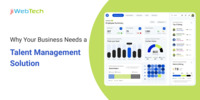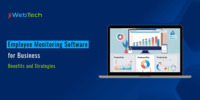- Jan 17, 2025
- Talent Management
- 1977
Share this post on:
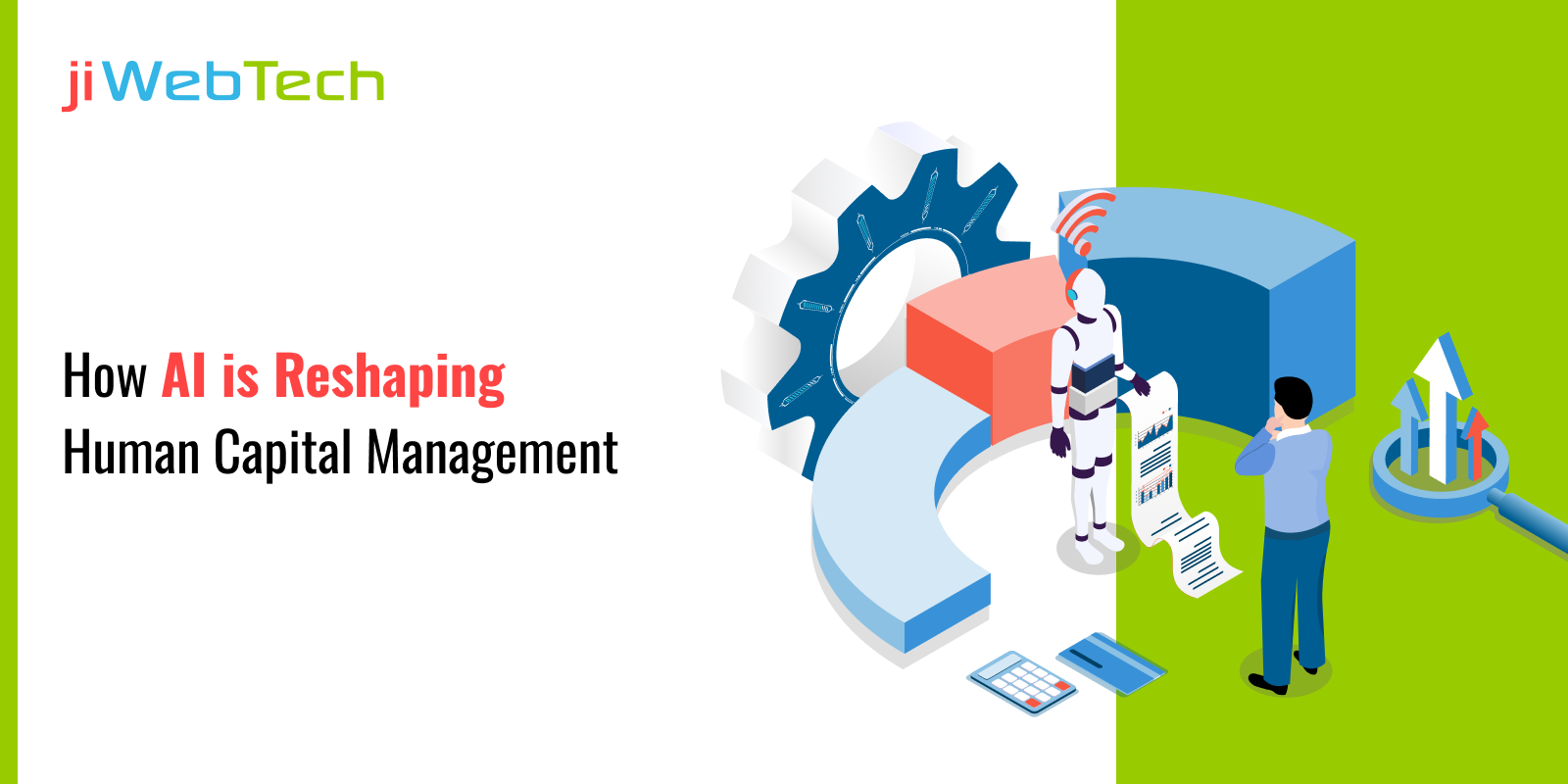
Human Capital Management (HCM) has been undergoing a transformation for several years now, with businesses seeking innovative solutions to optimize workforce management and employee engagement. Artificial Intelligence (AI) has emerged as a game-changer in the way organizations manage their human capital, enabling more effective decision-making, increased productivity, and enhanced employee satisfaction. This blog will explore how AI is reshaping Human Capital Management, the benefits of AI integration, and the challenges that come with it.
The Evolution of Human Capital Management
Human Capital Management (HCM) is the strategic approach to managing an organization’s most valuable asset—its people. Traditionally, HCM has focused on talent acquisition, training and development, performance management, and compensation. Over the years, organizations have embraced new technologies to streamline these processes, improve employee engagement, and align workforce management with business goals.
However, the rise of AI in recent years has taken HCM to new heights, offering solutions that go beyond automating mundane tasks. AI in HCM can now make data-driven predictions, enhance recruitment strategies, personalize employee development programs, and ensure a more seamless and enjoyable employee experience. It is transforming the traditional approach to managing human capital into a more dynamic, adaptive, and forward-thinking process.
The Role of AI in HCM Transformation
AI technologies are revolutionizing the way organizations approach HCM by introducing automation, data analytics, and machine learning. The primary goal of AI in HCM transformation is to enhance human decision-making with data-driven insights and predictions, improving both the efficiency and accuracy of HR processes.
1. Talent Acquisition and Recruitment
Recruiting the right talent is a critical component of any successful organization. AI tools are streamlining the recruitment process, from sourcing candidates to shortlisting resumes and scheduling interviews. AI-powered chatbots, for example, can engage with candidates and answer their queries, reducing the burden on HR professionals and ensuring a faster response time. Furthermore, AI algorithms can analyze vast amounts of data from resumes, social media profiles, and other sources to identify the best-fit candidates, significantly reducing human bias in the recruitment process.
AI also plays a role in enhancing candidate experience. AI tools can personalize communication with candidates, keeping them informed throughout the hiring process and improving their overall experience. By offering personalized interactions, candidates feel valued, which strengthens the employer brand.
2. Employee Engagement and Retention
Engagement and retention are key factors for any organization's long-term success. AI-powered tools can help HR departments track employee satisfaction levels, identify potential issues, and predict turnover before it happens. Sentiment analysis, which leverages AI to analyze employees’ feedback, emails, surveys, and even social media activity, is one of the most powerful tools in this regard. By assessing the mood and sentiment of employees, AI can alert HR managers about potential disengagement, enabling them to take proactive measures to address concerns.
AI can also personalize employee development programs. By analyzing an individual’s performance data, preferences, and learning styles, AI systems can suggest personalized training opportunities, certifications, or career development programs that are most likely to benefit the employee. This targeted approach not only improves employee satisfaction but also boosts overall organizational performance by aligning talent development with business needs.
3. Learning and Development
In the past, employee training and development were often one-size-fits-all programs that didn’t cater to the specific needs of individual employees. However, with the help of AI, learning and development programs can now be more personalized and adaptive. AI can analyze an employee's past learning behavior, performance, and preferences to recommend tailored learning paths that enhance their skills and capabilities.
For instance, AI can identify the areas where an employee is struggling and suggest relevant resources, courses, or mentorship opportunities to help them improve. Additionally, AI-driven platforms can monitor progress and provide real-time feedback, enabling employees to track their development and make adjustments accordingly. This ensures that employees are continually evolving and acquiring the skills necessary to meet the demands of the modern workplace.
4. Performance Management
Traditional performance reviews often rely on subjective assessments, which can result in bias and inconsistency. AI is transforming performance management by leveraging data-driven insights to provide a more objective and accurate picture of an employee’s performance. By analyzing a variety of data sources, including project outcomes, team collaboration, and feedback from peers and managers, AI can generate detailed performance metrics that offer a more holistic view of an employee's contributions.
Moreover, AI can help identify trends in employee performance over time, allowing HR professionals and managers to make informed decisions about promotions, raises, or development needs. AI can also automate routine tasks related to performance management, such as scheduling feedback sessions, tracking progress on goals, and sending reminders to both employees and managers.
5. Workforce Planning and Optimization
Workforce planning is an ongoing challenge for many organizations. It involves ensuring that the right number of employees with the right skill sets are available to meet current and future business needs. AI is helping businesses optimize workforce planning by analyzing historical data, identifying patterns, and forecasting future demand for talent.
AI can also assist in optimizing shift schedules, ensuring that organizations have adequate coverage without overstaffing or understaffing. By analyzing factors such as workload, employee preferences, and historical attendance patterns, AI-driven scheduling tools can make more efficient staffing decisions, reducing costs and improving employee satisfaction.
6. Predictive Analytics for Decision Making
One of the most powerful ways AI is reshaping Human Capital Management is through predictive analytics. AI systems can analyze large volumes of data to predict future trends, such as turnover rates, employee performance, or hiring needs. By understanding these trends, HR professionals can make more proactive decisions rather than reactive ones.
AI can also help HR professionals identify high-performing candidates for promotion, ensuring that succession planning is based on data-driven insights rather than gut feelings or subjective judgment. This ensures that organizations are prepared for future leadership transitions and have the right people in place to drive business growth.
Benefits of AI in Human Capital Management
The integration of AI in HCM has brought about numerous benefits for organizations, including:
1. Improved Efficiency: AI automates many routine tasks, freeing up HR professionals to focus on more strategic initiatives. Tasks such as resume screening, interview scheduling, and performance tracking can now be managed by AI systems, resulting in faster and more efficient HR operations.
2. Data-Driven Decision Making: AI enables HR teams to make decisions based on data rather than intuition. Predictive analytics and machine learning algorithms allow organizations to anticipate challenges, identify trends, and optimize workforce management strategies.
3. Enhanced Employee Experience: AI can provide personalized experiences for employees, from recruitment to training and performance management. By offering tailored learning paths and career development opportunities, AI helps employees feel more valued and engaged in their roles.
4. Reduced Bias: AI can help reduce human bias in various HR processes, such as recruitment, performance reviews, and promotions. By relying on data and algorithms, AI ensures that decisions are made based on objective criteria rather than subjective opinions.
5. Cost Savings: By automating repetitive tasks and optimizing workforce planning, AI can help organizations reduce costs associated with HR operations. AI can also help prevent costly turnover by predicting when employees are likely to leave and enabling proactive retention strategies.
6. Scalability: AI allows organizations to scale their HCM processes as they grow. Whether it's managing a large volume of job applications, analyzing employee performance across a global workforce, or predicting future talent needs, AI tools can handle large datasets and scale up as necessary.
Challenges and Considerations in AI-Driven HCM
While AI offers significant benefits, it also comes with its own set of challenges that organizations must consider. Some of the key challenges include:
1. Data Privacy and Security: AI systems rely on vast amounts of employee data to function effectively. This raises concerns about data privacy and security. Organizations must ensure that they comply with data protection regulations, such as GDPR, and implement robust security measures to protect sensitive employee information.
2. Bias in AI Algorithms: Although AI has the potential to reduce human bias, it can still perpetuate existing biases if the algorithms are trained on biased data. HR departments must ensure that the data used to train AI models is diverse, accurate, and free from bias to avoid reinforcing discriminatory practices.
3. Change Management: Implementing AI in HCM requires a shift in organizational culture and mindset. Employees and HR professionals may need training to effectively use AI tools, and there may be resistance to change. Proper change management strategies are crucial for successful AI adoption.
4. Human Oversight: While AI can automate many tasks, it’s important to have human oversight in the decision-making process. AI should be viewed as a tool to support HR professionals, not replace them. Human expertise is still needed to interpret AI-generated insights and make final decisions.
Conclusion: The Future of Human Capital Management
As AI continues to evolve, its impact on Human Capital Management will only grow stronger. The integration of AI in HCM is driving greater efficiency, productivity, and employee satisfaction, all while empowering organizations to make data-driven decisions. However, to fully realize the potential of AI, organizations must address challenges such as data privacy, bias, and change management.
For businesses looking to stay ahead in the AI-driven future, partnering with jiWebTech can help ensure a smooth transition into the world of AI-enhanced Human Capital Management. With a deep understanding of HCM transformation and cutting-edge AI solutions, jiWebTech can help organizations optimize their workforce strategies and create a more agile, data-driven, and future-ready HR ecosystem. Contact us today to learn more.





